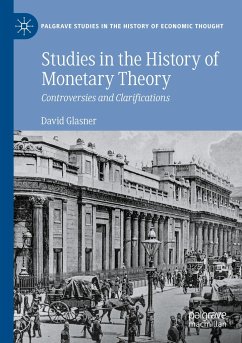
Studies in the History of Monetary Theory
Controversies and Clarifications
Versandkostenfrei!
Versandfertig in 6-10 Tagen
82,99 €
inkl. MwSt.
Weitere Ausgaben:

PAYBACK Punkte
41 °P sammeln!
This book presents an alternative approach to monetary theory that differs from the General Theory of Keynes, the Monetarism of Friedman, and the New Classicism of Lucas. Particular attention is given to the work of Hawtrey and his analysis of financial crises and his explanation of the Great Depression. The unduly neglected monetary theory of Hawtrey is examined in the context of his contemporaries Keynes and Hayek and the subsequent contributions of Friedman and of the Monetary Approach to the Balance of Payments.Studies in the History of Monetary Theory aims to highlight the misunderstandin...
This book presents an alternative approach to monetary theory that differs from the General Theory of Keynes, the Monetarism of Friedman, and the New Classicism of Lucas. Particular attention is given to the work of Hawtrey and his analysis of financial crises and his explanation of the Great Depression. The unduly neglected monetary theory of Hawtrey is examined in the context of his contemporaries Keynes and Hayek and the subsequent contributions of Friedman and of the Monetary Approach to the Balance of Payments.
Studies in the History of Monetary Theory aims to highlight the misunderstandings of the quantity theory and the price-specie-flow mechanism and to explain their unfortunate consequences for the subsequent development of monetary theory. The book is relevant to researchers, students, and policymakers interested in the history of economic thought, monetary theory, and monetary policy.
Studies in the History of Monetary Theory aims to highlight the misunderstandings of the quantity theory and the price-specie-flow mechanism and to explain their unfortunate consequences for the subsequent development of monetary theory. The book is relevant to researchers, students, and policymakers interested in the history of economic thought, monetary theory, and monetary policy.














